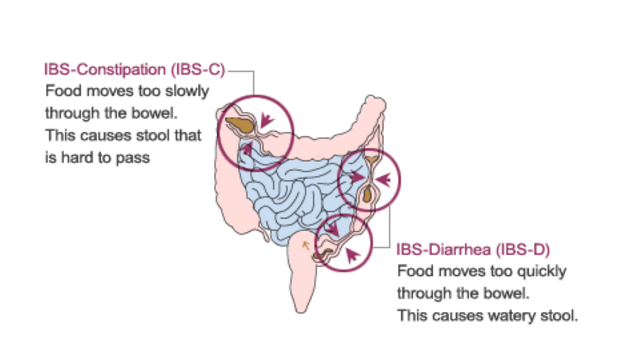
Irritable bowel syndrome (IBS) -- This disorder is also known as spastic colon, irritable colon, mucous colitis, and spastic colitis.
According to Ayurveda IBS known as Grahani / Sangrahani. it has many types of according to doshas. our gastric juice and enzyme / jatharagni which are responsible to digest the food gets impurities and undigested food comes out in the intestine and intestinal gut flor got irritability and pushes out many times this undigested material as a stool. So the patient feels spasmodic pain in the abdomen and goes to toilet many times. the patient feels weakness and weight loss.
some patients got Gall bladder surgery after some years they felt the same complaints also after years these types of patients got heaviness and burning in the anus like as piles patients.
Managing diet, lifestyle & stress, Other will need medication & counseling, yoga
Medication- Ayurvedic medicine releases your symptoms and improves your intestinal movements. we give you ayurvedic medicine for Aampachan and make a balanced diet for you.
According to doshas( Vata, pitta, Kapha) we added some ayurvedic medicine that covers that particularly involved dosha.
Anti-diarrheal, Gut antispasmodic laxative, Nerve Pain medication, Antibiotic, Dietary supplement.
Inflammatory bowel disease ( IBD) -- in this disorder in which the intestine becomes inflamed. Has often been thought of as an autoimmune disease.
Two major types of IBD-- (1) esoteric disease (2) ulcerative colitis.
Cause-- unknown some agent or a combination of agent- bacteria, virus antigen- triggers the body's immune system to produce an inflammatory section in the intestinal treat. Whatever causes it the reaction continues without control & damages the intestinal wall leading to diarrhea & abdominal pain.
Symptoms
Abdominal Cramps & Pain, Diarrhea that may be bloody. Severs urgency to have a bowel movement, fever, weight loss, loss of appetite iron deficiency anemia, due to blood loss
Complications IBD
(1) Profuse intestinal bleeding from ulcers.
(2) Perforation or rupture of the bowel.
(3) Narrowing- called a stricture, obstruction of the bowel found in Crohn's.
(4) Fistula perineal disease, disease in the fissure around the anus these conditions are more common in Crohn's than in ulcerative colitis.
(5) Toxic megacolon which is an extreme dilation of the colon that is life-threatening this is associated with more ulcerative colitis than Crohn's disease.
(6) Ulcerative colitis increases the risk of colon cancer.
(7) IBD can also affect other organs like skin, arthritis, inflammation of eyes, liver, kidney disorder, bone loss.
Diagnosis
Stool examination, CBC, Electrolyte, ESR, CRP, Perinuclear Antineutrophil cytoplasmic antibody ( PANCA), Sigmoidoscopy, Colonoscopy.

Management
Cortico Steroids
Amino Salicylates
Immunomodulators
Lifestyle Choice
Supplements
Surgery
